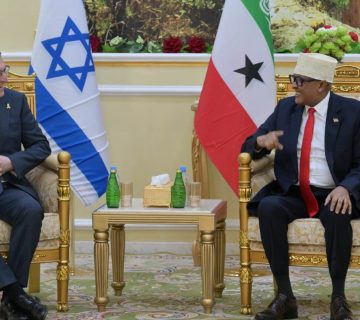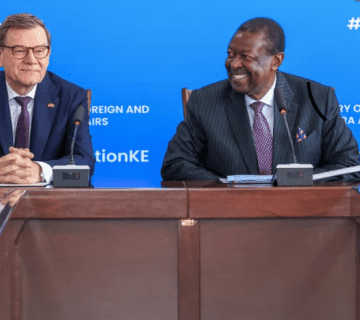The Horn of Africa, a region of significant strategic importance, is currently experiencing heightened tensions among key regional players, particularly Ethiopia, Egypt, and Somalia. Central to these tensions is the Somaliland-Ethiopia agreement, which has prompted a realignment of alliances and deepened long-standing rivalries, particularly between Egypt and Ethiopia. Ethiopia’s push for sea access and economic development, including its ambitious Grand Renaissance dam project, has fueled further disputes with both Somalia and Egypt. Recently, Somalia and Egypt formalized a military pact, which may lead to the deployment of Egyptian troops in Somalia, exacerbating Ethiopia’s concerns and intensifying regional tensions.
Ethiopia-Somaliland Deal
The current tension in the Horn of Africa is fueled by the controversial Somaliland-Ethiopia agreement. Somaliland, a region that has enjoyed de facto autonomy for over three decades without international recognition, signed a deal with Ethiopia to lease coastal land in exchange for potential recognition of its independence. For Somaliland, this agreement represents a strategic opportunity to gain international legitimacy by leveraging its geographic position to attract Ethiopian interests. In January, Ethiopian Prime Minister Abiy Ahmed formalized this relationship by signing a Memorandum of Understanding with Somaliland. The deal grants Ethiopia access to a 20-mile stretch of Somaliland’s coastline, including the strategic port of Berbera, for both commercial and military purposes. In return, Ethiopia reportedly agreed to recognize Somaliland as a sovereign state. For Ethiopia, this access to the sea is vital, especially after losing its coastline following Eritrea’s independence in the early 1990s. For Somaliland, the agreement holds the promise of formal recognition from a UN member state, a crucial step it has sought since declaring independence from Somalia in 1991.
While Somaliland fulfills the criteria outlined in the Montevideo Convention of 1933—having a permanent population, a defined territory, a government, and the capacity to enter into relations with other states—international recognition is still critically important. Article 3 of the convention notes that a state’s political existence is independent of recognition by other states, meaning a state can function and organize itself without it. However, in practice, recognition carries significant political and economic weight. Recognition by a UN member state would open doors for Somaliland to participate in international organizations, access global markets, and secure the diplomatic support necessary to fully operate on the international stage. For Somaliland, recognition is not merely a legal formality but a pathway to enhanced legitimacy and security. It would enable the government to engage in formal diplomatic relations, attract foreign investments, and tap into development aid that is unavailable to unrecognized states. Moreover, recognition would help solidify Somaliland’s independence from Somalia. Somalia’s government condemned the deal as an illegal act of aggression, declared it null and void, and retaliated by recalling its ambassador from Ethiopia and blocking an Ethiopian Airlines flight to Somaliland.
Egypt’s Involvement
The growing tensions between Ethiopia and Somalia have attracted the attention of Egypt, a regional power with its own grievances against Ethiopia. Egypt’s President Abdel Fattah El-Sisi expressed support for Somalia and criticized Ethiopia’s actions. This comes against the backdrop of a long-standing dispute between Egypt and Ethiopia over the Grand Ethiopian Renaissance Dam (GERD), a massive hydroelectric project on the Blue Nile River. Since 2011, Egypt has viewed the dam, which is more than 95% complete, as a serious threat to its water supply, given its heavy reliance on the Nile. Despite Ethiopia’s ambitions to boost electricity generation, Egypt fears the GERD could disrupt its water resources and has repeatedly warned of the potential for regional conflict. In 2021, Egypt appealed to the UN Security Council, labeling the dam a possible trigger for instability. In response to Ethiopia’s growing influence and the perceived threat posed by the GERD, Somalia has sought to strengthen its alliance with Egypt. This alignment is seen as a strategic move to counterbalance Ethiopia’s dominance in the region.
The Emerging Anti-Ethiopia Alliance
Speculation has grown about an emerging anti-Ethiopian alliance between Egypt and Somalia. In August, Egypt and Somalia signed a security pact, seen as a direct response to Ethiopia’s Somaliland deal. Egypt delivered its first shipment of military aid to Somalia in decades, signaling deepening cooperation. Egypt is also expected to contribute troops to the African Union Transition Mission in Somalia (ATMIS), potentially replacing Ethiopian forces. Somalia has made it clear that unless Ethiopia cancels its Somaliland deal, Ethiopian troops will be excluded from the new peacekeeping mission. This shift in military presence highlights a growing alignment between Egypt and Somalia, driven by mutual concerns over Ethiopia’s strategic moves in Somaliland. Ethiopia, alarmed by this development, has accused Somalia of collaborating with external powers to destabilize the region. For Ethiopia, Egypt’s growing involvement in Somalia poses a threat to its regional interests, particularly its desire to regain sea access and maintain fragile relations with Somaliland. During a press conference, both Presidents emphasized that their partnership aims to enhance security cooperation. For Somalia, this alliance boosts military capacity and signals a shift toward alliances with external actors like Egypt, who share its concerns about Ethiopia.
Conclusion
The interconnected nature of these disputes—Ethiopia’s ambitions for modernization and sea access, Egypt’s water security concerns, and Somalia’s territorial claims—complicates prospects for peaceful resolution. Although a full-scale conflict seems unlikely, proxy confrontations could further destabilize the Horn of Africa, a region already grappling with internal rebellions and insurgencies. To mitigate tensions, coordinated action through the African Union (AU) and the Intergovernmental Authority on Development (IGAD) is essential. IGAD’s local expertise and the AU’s broader peacemaking mandate can help facilitate dialogue and mediate disputes. Confidence-building measures between Ethiopia, Egypt, and Somalia, such as neutral mediation on sea access and shared development projects, could ease tensions. Ultimately, the international community must actively support regional efforts to maintain diplomatic channels and address the root causes of these conflicts. Without collective intervention, the Horn of Africa risks descending into further instability, with significant consequences for the broader geopolitical landscape of the Red Sea and the Gulf of Aden.
Photo Credits: Somalia’s Prime Minister’s Office
Bravin Onditi is a Researcher at the HORN Institute
The views expressed in this article are those of the authors and they do not necessarily reflect the position of the HORN Institute.



